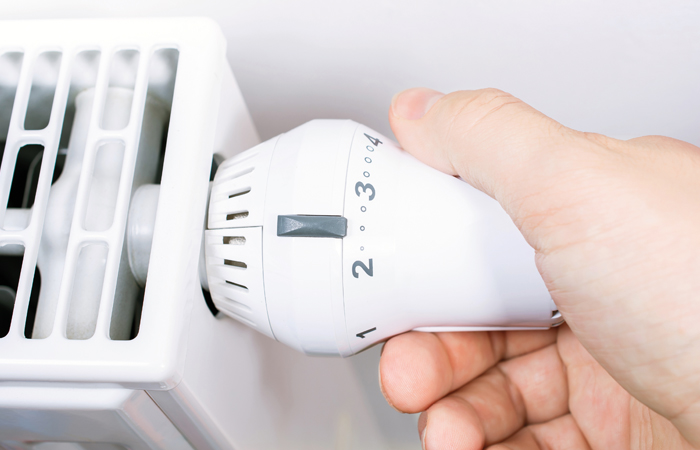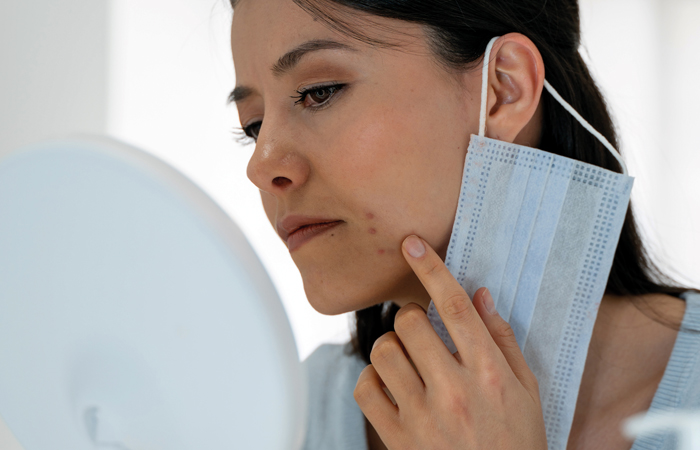Winter skin and scalp problems
In Conditions
Follow this topic
Bookmark
Record learning outcomes
The winter months can take their toll on the skin, often causing conditions to develop or flare up. Find out how pharmacy teams can help customers manage symptoms affecting the scalp and other areas of the body
The changing seasons can play havoc with skin, leaving it dull, dry, flaky and more prone to flare ups of conditions such as eczema. But it isn’t only the face and body that can suffer from the effects of the autumn and winter months. The scalp can be particularly sensitive to colder weather too, and certain scalp conditions, such as dandruff, seborrhoeic dermatitis and psoriasis, can be exacerbated at this time of year. Yet many people forget to take care of their scalp in the same way that they take care of their face and body.

“As the weather and temperature changes, becoming colder and wetter outside with drier air inside due to central heating, the scalp reacts to the lack of humidity,” says consultant trichologist Eva Proudman. “In the winter months, we often wear hats. This can cause the head to become hot and moist and, again, this can affect the scalp, causing conditions to flare up.”
Many people experience dry, flaky or itchy scalps from time to time, but certain people are more likely to experience long-term problems. According to Dr Zainab Laftah, consultant dermatologist and British Skin Foundation spokesperson, those with a personal or family history of psoriasis, eczema, seborrhoeic dermatitis or dry skin are most at risk of triggers, and these vary. “Flares of scalp dermatitis, similar to other skin diseases, can be triggered by stress,” she says. “The exact mechanism for this is not known, but is thought to be due to the release of pro-inflammatory chemical signals. Furthermore, certain medications, for example beta blockers, are also known triggers for psoriasis.”
According to research from skincare brand Neutrogena, scalp conditions are on the rise in the UK. Yet while 21 per cent of the UK population has experienced a medicated hair need – such as dandruff or a dry, sensitive or itchy scalp – they found that only 11 per cent of people have used a product at least once a week to treat their condition. Scalp problems are often considered to be trivial, but their impact should not be underestimated as they can cause discomfort and embarrassment, as well as affecting people’s self-esteem and confidence.
As the weather changes, more people may visit the pharmacy for advice on scalp problems, so it is important for pharmacy teams to highlight that support and products are available.
Common scalp conditions
Dandruff, seborrhoeic dermatitis and psoriasis can cause similar symptoms. According to consultant dermatologist Dr Anton Alexandroff, the overlap in the diagnosis of scalp conditions means the initial management is often the same. “It is not particularly important to establish an exact diagnosis before trying over-the-counter (OTC) treatments,” he says. “In fact, in many cases the cause of dandruff is either psoriasis or seborrhoeic dermatitis.”
Dandruff
The most common scalp condition, dandruff affects around half of adults, especially those in their 20s and 30s. “It is caused by an increase in the production of the natural yeast that lives on the scalp,” says Eva. “Dandruff tends to be white or silvery flakes noticeable in the hair, there isn’t any redness and often there is no itching or irritation.”
Signposting suggestion: NHS: dandruff.
Seborrhoeic dermatitis
Affecting up to five in every 100 people in the UK, seborrhoeic dermatitis is more common in men than women. Some people first develop it as a teenager, or between the ages of 30 and 70. “Seborrhoeic dermatitis is caused by an increase in the natural yeast, malassezia furfur, on the seborrhoeic areas of the body,” says Eva. “It is often associated with allergic (atopic) conditions such as asthma, eczema and hayfever. Other possible triggers are highly spiced foods, nuts, chocolate, shellfish and alcohol, particularly white wine, as well as excessive sweating.”
Mild cases may look like dandruff, but more serious cases can cause greasy-looking skin and affect other parts of the body. “The scalp is often itchy with some redness visible. The flakes tend to be yellow in colour and can sometimes feel a little bit crusty,” explains Eva. “Seborrhoeic dermatitis can often be seen in the eyebrows, around the nose and to the central core of the body.”
Signposting suggestion: NICE: seborrhoeic dermatitis.
Flares of scalp dermatitis, similar to other skin diseases, can be triggered by stress
Psoriasis
Around one in every 50 people in the UK suffer from psoriasis and it can appear at any age. It is a chronic autoimmune condition in which normal skin cells are produced much faster than they are shed. This leads to a build up of cells on the skin’s surface, causing plaques of raised, red, flaky skin covered with silvery scales. The skin can also become inflamed and, in very bad cases, scalp psoriasis can cause hair loss. Some people may have psoriasis on their scalp only, but others may have more widespread symptoms.
“Psoriasis is a chronic relapsing condition, often found on other parts of the body, particularly the elbows,” Eva explains. “It has no defined cause. It can be a familial trait, and the condition can be triggered by stress, skin damage, illness, bacterial infections and certain medications, such as antidepressants, antihypertensive, beta-blockers and antimalarial drugs. Psoriasis can often exist where there are other inflammatory autoimmune disorders.”
Signposting suggestion: Psoriasis Association.
Warning signs
If a customer’s symptoms don’t clear up with over-the-counter (OTC) products and self care measures, or they have severe scaling on the scalp, they will need to consult their GP. Customers should also be referred if they have scalp psoriasis or any discharge, burning or crusting.
“Red flag symptoms to look for are pain, infection, smell and hair loss,” says consultant trichologist Eva Proudman. “If any of these are being reported, it is important to get an accurate diagnosis of the condition(s). This means an effective treatment plan can be developed, which may include a combination of prescribed medicines and OTC products.”
Pharmacy management
There are many medicated treatments available over the counter for scalp conditions. Customers will have to use trial and error to discover what works best for them and fits in with their lifestyle. Some products need to be used more regularly or may be messy to use, so these should be taken into consideration. It can also take a few weeks for the symptoms to clear up so patience may be required. Scalp conditions tend to flare up and down, and customers will usually need to keep using the products once a week after the symptoms have cleared up to stop them coming back.
Eva recommends a treatment shampoo for dandruff containing salicylic acid or piroctone olamine, as both are particularly good ingredients for the scalp. “Seborrhoeic dermatitis needs a stronger treatment shampoo, such as a coal tar base or a keratolytic base,” she says. “Sometimes, trichological scalp treatments may be required, or prescribed topical steroids. Psoriasis needs the strongest treatment shampoo to remove the excessive layers of skin. Trichological scalp treatments are very effective at doing this when the condition is flaring up. Prescribed treatments would be topical steroid lotions or creams and sometimes steroid shampoos.”
Dr Laftah suggests using an antifungal shampoo containing ketoconazole for seborrhoeic dermatitis and dandruff to help to reduce scaling, or coal tar-based shampoos to reduce inflammation associated with psoriasis. “Leave medicated shampoos on the scalp for 10 minutes before washing off to help reduce inflammation and any associated itch,” she says. “If thick scale is present, massaging a rich moisturiser, for example coconut oil, into the scalp – particularly at night – may be helpful at reducing the scales.”
As with other areas of the skin, maintaining the skin barrier is key. “Remember the scalp is still skin, and therefore ensuring the skin barrier is optimal may help to reduce flares,” says Dr Laftah. “If customers do experience a flare, treating it early may help to prevent it from getting worse.”
The overlap in the diagnosis of scalp conditions means the initial management is often the same
Self care measures
Despite common misconceptions, scalp conditions are not caused by poor hygiene, nor are they contagious. Customers should be advised to eat a healthy balanced diet, including plenty of essential fatty acids, and try cutting down on sugary foods. Brushing their hair regularly to remove dead skin cells, and massaging the scalp gently when washing their hair, may also help. Some customers may notice that using hairdryers or colouring, bleaching or perming products worsens their scalp symptoms.
Dr Alexandroff has these extra tips to pass on to pharmacy customers who are prone to dry, flaky scalp conditions:
- Try to keep the central heating on a slightly lower setting, as this helps reduce dry skin, dry scalps and, importantly, bills. Not to mention, also reducing the effects of greenhouse gases
- Advise customers to moisturise their skin regularly, especially when they are coming back from outside, in the morning before going out and in the evening before they go to sleep, to keep their skin healthy
- Generally, lighter topical products such as lotions are more suitable to use in the morning, so skin doesn’t look greasy. Richer products, such as creams and ointments, are more suited in the evening, as they are more nutritious and help to recharge the skin overnight
- Having a humidifier at home helps to avoid drying out the skin and hair.

From top to toe
It’s not just the scalp that can suffer from the effects of the weather. Skin conditions all over the body can flare up in the winter months, and pharmacy teams should be ready to give advice to help customers manage their condition and make them feel a little more comfortable.
Eczema
Eczema can leave the skin feeling dry, flaky and itchy, especially on exposed areas, such as the hands and face. “Both eczema and contact dermatitis may worsen in the winter,” explains Dr Laftah. “The low humidity with the cold weather and central heating reduces the integrity of our skin barrier function. Therefore our body’s first-line of defence against environmental stressors is compromised, often lowering the threshold for flare-ups. Regular use of moisturisers will help to restore the skin barrier and protect it from environmental insults.”
Rosacea
Affecting around one in 10 people in the UK, rosacea is especially common in women, those aged 30-50 and those with fair skin. “Rosacea-prone skin can be very sensitive, and harsh wind and cold air can trigger a flare,” says Dr Laftah. “Patients often experience facial redness, sometimes with associated swelling and acne-like pimples. Some patients may also develop eye involvement, with red gritty eyes and blurring of vision.”
If customers feel uncomfortable as a result of the redness, there are options available. For example, they can buy skin camouflage products to disguise it. “Opting for simple skincare products designed for sensitive skin is recommended,” says Dr Laftah. “Active ingredients, for example azelaic acid, can help to dampen down inflammation. However, often prescription medication is required if there is a significant flare.”
Rosacea-prone skin can be very sensitive, and harsh wind and cold air can trigger a flare
Cold sores
Small, blister-like spots that appear close to the lips, cold sores are caused by the herpes simplex type 1 virus (HSV-1). Some people can have two or three outbreaks of cold sores each year. “Triggers for cold sores include stress and respiratory infections. The latter, particularly common colds and the flu, are more common in winter. Ensuring your immune system is optimal may help reduce cold sores,” says Dr Laftah. “During the winter months, due to lack of sunshine, the majority of us become deficient in vitamin D. Vitamin D is known to have numerous beneficial effects on our immune system and therefore taking a daily supplement will ensure our levels are maintained.”
An outbreak usually starts with a tingling or burning sensation before the cold sore appears. The sore is often filled with fluid and may weep before healing after seven to 10 days. Cold sores can be treated with antiviral creams, which are most effective when used at the tingling stage, and these should be applied several times a day. Other cold sore creams containing antiseptics, local anaesthetics and astringents are also available. Pharmacy teams can recommend cold sore patches or hydrocolloid dressings, which seal the cold sore to stop it spreading, while aiding the healing process.
Tackling ‘maskne’

Many people find that wearing face coverings, especially for long periods of time, is triggering skin redness and breakouts, mainly shallow whiteheads rather than deep, sore red spots. Known as ‘maskne’, these types of breakouts are easy to identify because they only occur around the lower part of the face, on the chin, nose and around the mouth. They are caused by the excess heat and pressure of the material against the face, which creates a breakdown in the natural protective layer of skin. This then encourages bacterial growth.
“Masks rub against the skin and make it more difficult for the skin to breathe,” says consultant dermatologist Dr Anton Alexandroff. “This can cause eczema-like irritation and/or acne-like problems, or make existing acne and/or eczema worse.”
With masks now compulsory for the vast majority of the population, pharmacy teams can offer tips and advice for dealing with the effects. “If acne worsens or is triggered, use gentle, water-based cleansers and moisturisers after removing the mask. Additionally, stop wearing cosmetics until the skin heals, and wash the face using a water-based face wash,” Dr Alexandroff advises. “Lastly, having multiple face masks and wearing a different one each day can help to manage breakouts.” And of course, regularly washing the mask is vital for both the skin and avoiding virus transmission.
Signposting suggestion: British Skin Foundation: Maskne – what's the hype?.
